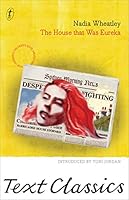- Welcome to FictionDB, Guest
- | My Account
- | Help

The House that Was Eureka — Nadia Wheatley
buy the book from amazon
Paperback editions:
Hardcover editions:
eBook editions:
Audio editions:
Large Print editions:
Description
Winner of the New South Wales Premier's Children's Book Award, 1985.
It's 1981 and Evie is sixteen. She has left school but can't find work, and her family has just moved into the run-down inner Sydney suburb of Newtown. Noel lives in the adjoining terrace house. He's fifteen, not taking school seriously and fed up with looking after his ancient bed-ridden grandmother.
As a friendship grows between Evie and Noel, the past is set back in motion, and the events of the 1930s Depression era begin to play out in the high-unemployment times of the early 1980s, and the house again is the centre of the Sydney anti-eviction campaign of 1931.
Based on historical fact, meticulously researched, The House that Was Eureka is a critically acclaimed novel about a history we all share.
Nadia Wheatley is a long-standing fixture of Australian literature having written fiction and non-fiction for both children and adults. Seven of her books have been Children's Book Council of Australia Honour Books including Five Times Dizzy, The House that Was Eureka and My Place. She has won the New South Wales Premier's Children's Book Prize twice, for The House that Was Eureka and Five Times Dizzy and is known and respected for her contributions to Indigenous communities and the preservation of environment. Nadia is currently the Artist in Residence at The University of Sydney.
textclassics.com.au
'A fine piece of work, well researched and beautifully plotted around the Depression when people were tipped out of their houses by landlords and unemployed men took to the roads with swags.' Sydney Morning Herald
'An absorbing and wholly convincing recreation of the Depression of the 1930s, with the traumatic experiences of the Cruise family, destitute and threatened with eviction, running parallel to the problems of today.' Australian Book Review
'Wheatley's book has urgency and a fierce strength...The characters from both eras are "alive and flying", freedom fighters who are aware that they are making history.' Maurice Saxby

 Amazon UK
Amazon UK